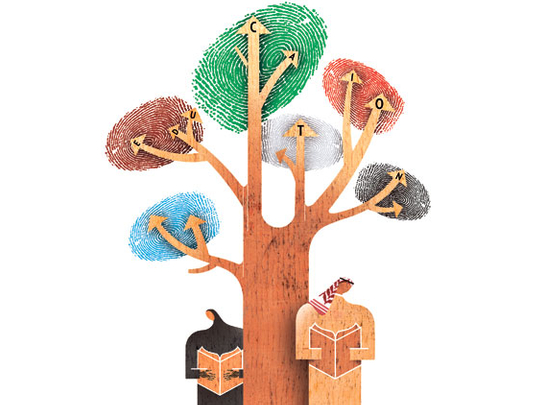
Young people in the Gulf Cooperation Council (GCC) are heavily convinced that education is important for their future, in stark contrast to the youth of non-GCC Arab states who do not care about it. An average of 63 per cent of young people in the GCC plan on going into further education, compared to a miserable 14 per cent from the non-GCC states, and the UAE comes highest with 90 per cent of its young people committed to seeking further education.
A similar disastrous contrast is seen in young people's attitudes to entrepreneurship, with 62 per cent of young people in the GCC intending to start their own business in the next five years, compared to a far more risk averse 32 per cent in non-GCC Arab states.
These numbers should really worry the governments of Jordan, Lebanon Egypt and Iraq, where Asda'a Burson-Marsteller carried out the third Arab Youth Survey. Education and a respect for education is a vital key for long term success in the global economy, and if the young people of these countries are not interested in education, it will give their leaders a major challenge.
Many Asian countries have proved this point many times, as smaller states like Singapore and Hong Kong, or huge ones like India and China, have found their way to become world leaders through their trained and educated work forces.
Similarly, this survey should encourage the GCC governments, since it shows that their populations understand the value of education and entrepreneurship. Of course, part of the reason for the sharp difference might be that the young people in the GCC states have grown up watching expatriates make very good livings out of their countries thanks to their education and training.
Young GCC nationals have been continuously exposed to international thinking, right in their home countries. This will naturally lead to a sense of envy, but also to a more constructive sense that if they can do it, so can we.
But young Arab people share a lot more than divides them. The third Arab Youth Survey found consistent shared concerns all through the Arab world, as young people all worried about practical lifestyle issues.
In answer to the question ‘What is the biggest challenge facing the Middle East today?' 48 per cent said the rising cost of living, followed by unemployment (34 per cent), the state of the economy (24 per cent), as well as more political and social issues like the state of human rights (26 per cent) and closing the gap between the rich and poor (20 per cent).
It was very clear young Arabs put the region's tortured politics firmly into the territory of their leaders, without caring about it too much themselves.
Fine balance
Only 13 per cent found the Middle East conflict to be the biggest challenge facing the Middle East today, which means that most young Arabs find it less relevant to their concerns, since they certainly cannot have found the Middle East's conflicts easy to solve. Similarly, international conflicts got 13 per cent, and climate change only 12 per cent.
It was also startling, and quite encouraging, that a very large number of young Arabs from all countries found traditional values to be extremely important. An average of 82 per cent of all young Arabs (82 per cent in the GCC and 83 per cent in non-GCC) agreed with the statement that ‘traditional values mean a lot to me and ought to be preserved for generations to come'. This is important since it shows that despite welcome global influences, and being ready to take their place in the global economy, young Arabs are not drifting into becoming wannabe Americans or Indians, and are confident of their own national and Arab identities.
There was an interesting exception in Saudi Arabia, which scored the lowest (69 per cent) in respect for traditional values, doubtless giving pause to the exponents of some of that state's more extreme manifestations.
But across the whole Arab world, this clarity on traditional values was not a call for more conservative politics, since a substantial majority of young people from all Arab countries supported the current uprisings and protests.
Indeed, the 20 per cent who identified themselves as liberal in January 2011, grew to 51 per cent by February under the influence of the successful uprisings in Egypt and Tunisia.
This powerful combination of an interest in education and entrepreneurship, a focus on the secular concerns of lifestyle and economic well-being, and a firm sense of identity, denies the concerns of far too many in the world at large who see the Arab world tipping into some kind of Islamic political miasma.
As the Egyptians and Tunisians work their way forward in an open and transparent political manner, and as the Libyans try to do the same but by fighting in their deserts and streets, there are far too many commentators who see the threat of well organised Islamic parties waiting to take advantage of the collapse of the military establishments.
What the third Arab Youth Survey has done is prove that there is a third liberal alternative, which is neither an Islamic nor authoritarian government. The secular aspirations of the protesters in Tahrir Square and in Tunisia were always very clear, but it takes something like this survey to put them into a wider context.









